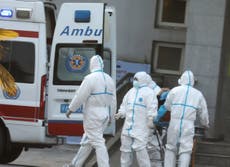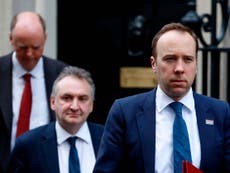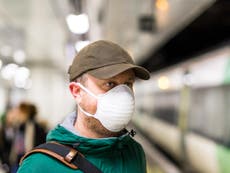When doctors cause patients harm, we have a legal duty to be honest. The government should uphold the same standards
The key to improving things is acknowledging all the mistakes that have occurred. Employing the same ‘Duty of Candour’ process NHS workers like me follow seems a reasonable starting point


In the UK, the daily coronavirus death toll is equivalent to over a hospital’s worth of patients a day. In the NHS, we continue to mourn our colleagues while attending to our duties. But while recognition of the work done by society’s true key workers is visible in the public's engagement with clap for carers, moves made on a governmental level demonstrate little evidence of lessons learnt – especially concerning the ongoing debacle over Personal Protective Equipment (PPE).
As the death toll of the general public and NHS workers climb, distressing stories around PPE issues are worsening. Take for instance the news that coroners have been advised not to take into account systemic issues such as PPE provision when holding inquests into the deaths of NHS workers. It sets an incredibly dangerous precedent regarding workplace safety, sparking fears among frontline staff that their deaths may simply amount to inconveniences to be covered up.
There is good evidence that the amount of viral load (ie the amount of virus one is exposed to) is proportional to the severity of symptoms and mortality caused by Covid-19, and therefore the distribution of Personal Protective Equipment (PPE) is vital. In this regard, the governmental response has been found wanting, and nudging into negligent territory. Data collected by BAPIO (British Association of Physicians of Indian Origin) last month found that only 20 per cent of 2,003 health care workers surveyed had PPE that was fit for purpose.
Over the last few days, as the blame game ramps up, PPE provision has started to become a factional, politicised matter. But this issue is more complicated than sound bite politics.
For example, masks come in various levels of protection. The main studies quoted in governmental recommendations originate from a Health and Safety Executive study looking at the transmissibility of the influenza virus. It found that surgical masks provide around a six-fold reduction in exposure but live viruses could be detected in the air behind all surgical masks tested. By contrast, properly fitted respirators (ie masks with a filter) could provide at least a 100-fold reduction against the aerosolised virus. Yet current guidance on Covid-19 patients has recommended that we use standard surgical masks (non-filtered) only except when an “aerosol-generating procedure” is being done with the more transmissible coronavirus.
Bear in mind such advice was based on studies on influenza, not the more transmissible novel coronavirus, so downgrading protection here is at best illogical. It also muddies the extent to which the government is exposing NHS workers to risk, raising questions with regard to whether PPE guidance was based on safety or supply.
When ministers are questioned on PPE in regards to PHE guidance, the answers must relate to safe PPE rather than raw numbers that can be readily manipulated. Again, the reasons for PPE advice must be clearly stated – is it about welfare or stock?
While claims of adequate PPE supply are made on a daily basis, the reality at the frontline is different. Volunteer doctor organisations such as DAUK (Doctors Association UK) have organised the delivery of 45,000 masks and continue to coordinate more. These are professionals working on top of their normal hours, yet the government continues to stumble, as evidenced by shortages of gowns in London hospitals, to name one of many examples. It goes without saying that in a developed nation such as the UK, it should not come to this.
Governmental simulations showed as early as 2017 that pandemic preparation was lacking. The fact that it took until 10 April for a PPE plan to be published despite two months of pleading and over two years of advanced knowledge of shortages speaks to a government that at best is failing in its basic duty to ensure that NHS workers are protected. At worst – well, the outcome may be for the courts to decide. Doctors are rightly growing more frustrated and legal battles are on the horizon.
The key to giving those who need PPE access to it is acknowledging mistakes that have happened to date. In terms of moving towards a resolution, there are two processes that need to be considered.
Legally, when harm has occurred to a patient, a process known as “Duty of Candour” begins. The procedure can be summarised as follows:
- Tell the patient (or, where appropriate, the patient’s advocate, carer or family) when something has gone wrong.
- Apologise to the patient.
- Offer an appropriate remedy or support to put matters right (if possible).
- Explain fully to the patient (or, where appropriate, the patient’s advocate, carer or family) the short- and long-term effects of what has happened.
Employing this Duty of Candour process seems a reasonable starting point with regards to PPE procurement, as it is clear that some NHS workers, many of whom are from Bame backgrounds, have come into harm and lost their lives. An apology, as requested by some families who have lost loved ones, is the starting point. Inquests should be allowed to investigate any factors that may have led to healthcare workers’ deaths. It is the next necessary step towards setting things right.
The campaign for “Learn Not Blame” from the Doctors Association UK also aims to provide a solution. The campaign, borne out of tragedies involving systemic failures within the NHS, aims to create a better culture that promotes learning from adverse events. It also prioritises fairness, openness and the wellbeing of both patients and health care professionals. This is precisely what is needed for PPE issues, not politicisation.
Boris Johnson has stated that he owes his life to the NHS. It is time for his government to stop hiding behind substandard policy announcements as a means of glossing over deficiencies. The message should be simple for all government ministers involved in PPE delivery and media briefings: learn and do not blame; apologise and acknowledge mistakes so that we can do our jobs safely.
Dolin Bhagawati is a London-based neurosurgeon. If you wish to donate to Doctors Association UK, you can do so here




Join our commenting forum
Join thought-provoking conversations, follow other Independent readers and see their replies